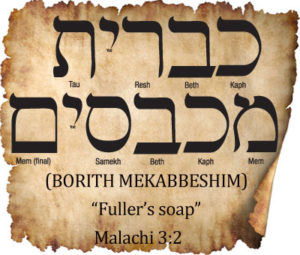HEBREW WORD STUDY – FULLER’S SOAP – BORITH MEKABBESHIM
Malachi 3:2: “But who may abide the day of his coming? and who shall stand when he appeareth? for he [is] like a refiner’s fire, and like fullers’ soap
 The day of His coming is not a reference to an actual appearance. We are so used to the words Second Coming and the appearance of the Lord in the skies as a future event that we automatically reference this to the Second Coming of Jesus. We have what is known as on-going prophecy. This is a prophecy with a fulfillment in the time it was given but was also a picture of a future event. The event occurred shortly after Malachi gave this prophecy, but it is recorded for us because there will be a future event similar to this that will take place.
The day of His coming is not a reference to an actual appearance. We are so used to the words Second Coming and the appearance of the Lord in the skies as a future event that we automatically reference this to the Second Coming of Jesus. We have what is known as on-going prophecy. This is a prophecy with a fulfillment in the time it was given but was also a picture of a future event. The event occurred shortly after Malachi gave this prophecy, but it is recorded for us because there will be a future event similar to this that will take place.
The word for coming in Hebrew is bo which means to fall upon or even to attack. Who can abide when the Lord falls upon you or attacks you. The English word coming is an unfortunate word to use here because it implies making an appearance. Actually, the Lord is here right now, He does not need to make an appearance. However, it would be nice if He would fall upon us. Then again, maybe it would not be so nice. If He falls upon us we get all his glory and holiness, that would be good. However, if we are in sin well light and darkness do not mix and our sins will either be cleaned or will block any protection from God from the consequences of that sin.
The passage says “Who can abide the day of his falling upon us?” The word abide is kool which means to seize contain and measure up. The picture is one of sheltering. When these events take place, God will fall upon us measure us up and if we are found worthy, clean and compatible He will protect us. This is followed by “Who shall stand when he appears.” The word stand is ‘amad which is standing in support of something. God’s protection comes for those who stand (in support) with Him.
Then it says something quite intriguing. He will be like a refiner’s fire and fuller’s soap. I believe this is definitely a reference to Jesus who will come a couple hundred years later who will cleanse and make one pure so they can join with the holiness of God to be protected.
So I believe what we have here in Malachi 3;2 is a call to salvation. Just like an evangelistic meeting, Who will stand for the Lord and be cleansed like a refining fire and fuller’s soap to be found worthy of allowing God to fall upon them with His presence and protection. That verse applies just as much to us today as it did back then and in fact, applies to each one of us right now.
Just one final word about this fuller’s soap. A fuller or a borith is one who presses or whitens cloth by pounding it with one’s feet, hands or a club to rid it of its impurities. A soap or alkali from the ashes a plant mekabbeshim is used to bleach the cloth. You know sometimes that cleansing process if not enjoyable. I was talking with someone today about Noami in the Book of Ruth who wanted to be called Marah because she was bitter and the Lord marar or dealt bitterly with her. I never like that idea of God dealing bitterly with someone. Besides that, it appears this Godly woman was looking for sympathy. But when I studied this word marar or bitter I found its Semitic origins is the word for bile, that acid taste that comes to your mouth when you are spitting up. Yet this also comes from the same root as myrrah which is a sweet perfume or essential oil used for medicinal purposes. Myrrah was used to sooth skin abrasions. So when Noami said that God was dealing bitterly with her she was making a play on words here. She was asked to be called Marah not because she wanted sympathy, but that she did not want sympathy. She was declaring that she was being cleansed by borith mekabbeshim fuller’s soap. God was putting her through a cleansing process which was not pleasant, but don’t feel sorry for Noami, because this was only a process to help cleanse her and make her pure.







Recent Comments